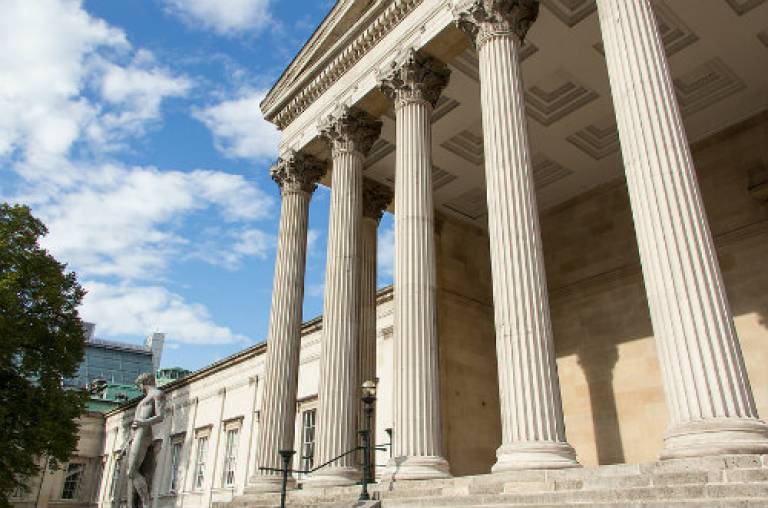A research-based education in the UCL Faculty of Laws
Olga Thomas (Vice Dean Education, Faculty Tutor) shares how the UCL Faculty of Laws' long-standing history of learning through research and inquiry is exemplified through two innovative modules.

16 September 2015
The nature of the law discipline resulted in our programmes having already been heavily embedded in research-based education and operating on a connected curriculum, before these directions became UCL 2034 strategic objectives.
A subject founded in research
The teaching of law, and in particular common law, is profoundly research-based.
The study of law is primarily based on the study of case judgments, which are the prime examples of legal research within the professional community, or of academic research, often that of the academic teaching the subject, reviewing such judgments.
The students themselves engage in and learn through research and inquiry, by using legal research to respond to legal scenarios, problem questions, which form the subject matter of tutorial discussions.
Students connect with staff and their research, connect academic learning with learning for future employment and certainly connect out to the world and the practical experiences that necessitate legal intervention.
This is the case in most law modules but the innovative modules described below are good examples particularly of connections out to the community.
We of course remain committed to enhancing these aspects of our offering and to being inspired by the UCL momentum Research-based Education and Connected Curriculum have acquired, to make further innovative inroads.
The Faculty aims to explore a connected ‘through line’ of research and the diversification of assessment methods to include some form of research ‘outputs’ in its next curriculum review.
It has also joined the UCL ChangeMakers initiative to explore use of group work assessment, hardly used in legal education, as a way to promote the ‘students connecting closely with one another’ strand of the Connected Curriculum.
The LLB Access to Justice and Community Engagement module
Launched in 2011-2012, in this module students explore the theoretical aspects of access to justice by engaging with academic scholarship and research while undertaking practical casework in a specific area of law by each student taking on a real client from the community.
We currently operate ‘law clinics’ in employment law, education law and welfare law and work with charities and the Citizens Advice Bureau who pass on clients to the Faculty.
We are hoping to expand the offering to a walk-in law clinic in UCL East.
Students undertake legal research to find answers to their client’s problems as well as for strategic litigation and work very closely with staff on both.
They make connections between their research and practical experiences with the client, they connect with professionals and with the wider community in London, they connect their learning to future employment and their assessment, which includes a formal presentation of their casework and journal entries and is very much in the form of research ‘outputs’.
The LLM LARCS (Legal Access and Research for Communities and Sustainability) module provides a framework for UCL’s LLM law students to carry out research and provide advice to local communities, with training and on-going support and supervision from Living Space Project, a social enterprise, non-profit making organisation and environmental justice pioneer, and the Environmental Law Foundation, an access to environmental justice charity.
The students’ advice notes are published as general guides to environmental issues.
To date, LARCS students have provided advice and published ‘Step by Step’ Guides on Transferring Land into Community Ownership, Community Organisations and Food Growing, Registering Land as a Town or Village Green, Community Bill of Rights and Neighbourhood Planning, Fracking from a Community Perspective and Moving Towards a District-Wide Wood Fuelled Heating System.
This advice work which enables the students to connect their research across subject disciplines and out to the world, provides the foundation of long essays which are scholarly and reflective and form the basis of assessment for the course. Students who have studied on the LARCS course have gone on to work in NGOs, charities and public interest organisations and the UN.
Law Without Walls programme
The Faculty is also part of the award-winning course pioneered by University of Miami School of Law and taught in conjunction with leading law schools across the globe including:
- UCL Laws
- Harvard Law School
- Stanford Law School
- Fordham Law School
- New York Law School
- Peking University (STL)
- University of St Gallen
- University of Sydney.
We are the only Faculty in the UK participating in the programme, so this is a unique opportunity offered to our LLM students.
The course explores innovations in global legal education and practice through weekly virtual classes (‘LWOW Live’) and collaborative research.
UCL students attend the interactive LWOW Live seminars on Adobe Connect whilst also working in smaller groups with students from other participating law schools to conduct research on an assigned topic.
These groups work throughout the term, supported by mentors who are international experts in their field to identify an innovative solution (their ‘project of worth’) to a challenge or opportunity arising from the globalisation of legal practice and/or education.
These projects of worth are then presented to the LWOW community at the end of the programme. The topics are interdisciplinary and wide-ranging, looking to the future in their anticipation of changes to legal practice and education within a virtual landscape.
 Close
Close

